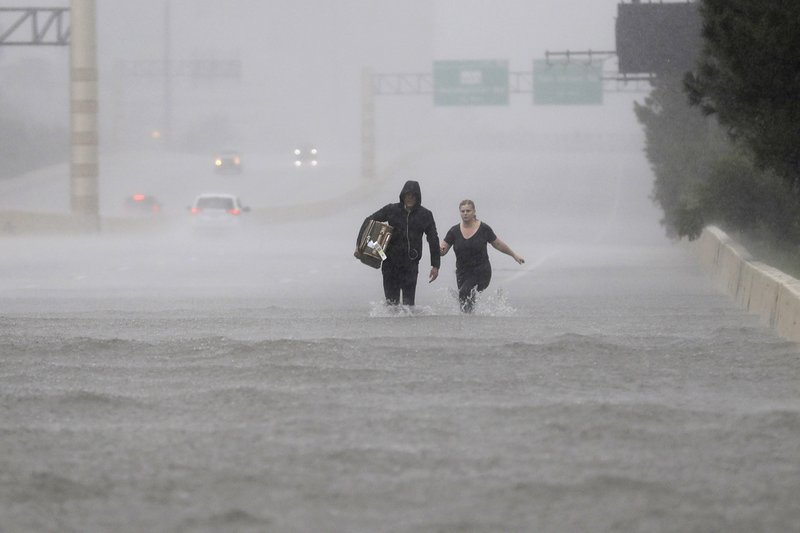How to Survive the End of the World
Amid climate change-fueled natural disasters and Trump's flippant tweets on nuclear war, some look to practical survival measures. Survivors try to flee during Hurricane Harvey. (Associated Press)
Survivors try to flee during Hurricane Harvey. (Associated Press)
Amid natural disasters fueled by climate change, President Trump’s flippant comments on nuclear war and overhaul of national nuclear weapons policy, some writers and politicians are speaking out about their concern over possible global disaster and for practical survival measures people can prepare to take.
The Republican chairman of the Senate Foreign Relations Committee, Bob Corker, said in an interview Sunday that Trump is treating his office like “a reality show,” with reckless threats toward other countries that could set the nation “on the path to World War III.” The New York Times continues:
In an extraordinary rebuke of a president of his own party, Mr. Corker said he was alarmed about a president who acts “like he’s doing ‘The Apprentice’ or something.”
“He concerns me,” Mr. Corker added. “He would have to concern anyone who cares about our nation.”
Mr. Corker’s comments capped a remarkable day of sulfurous insults between the president and the Tennessee senator — a powerful, if lame-duck, lawmaker, whose support will be critical to the president on tax reform and the fate of the Iran nuclear deal.
The Times also reported that Corker felt Trump had “repeatedly undermined diplomacy with his Twitter fingers,” a claim that bears even more significance after the president’s cryptic tweet Saturday that “only one thing will work” to stop North Korea’s nuclear program.
…hasn’t worked, agreements violated before the ink was dry, makings fools of U.S. negotiators. Sorry, but only one thing will work!
— Donald J. Trump (@realDonaldTrump) October 7, 2017
Trump and Corker feuded on Twitter Sunday morning, with Trump saying Corker decided not to run for re-election because he “didn’t have the guts.” Mr. Corker said in his own tweet: “It’s a shame the White House has become an adult day care center. Someone obviously missed their shift this morning.”
“I know he has hurt, in several instances, he’s hurt us as it relates to negotiations that were underway by tweeting things out,” Mr. Corker said to the New York Times.
On the environmental front, Matthew Stein, author of “When Disaster Strikes,” a comprehensive guide for emergency planning and crisis survival, spoke with Truthdig columnist Sonali Kolhatkar about practical survival measures people should take at home.
“Given the new normal, I’d say everybody and their brother should be prepared for emergencies,” he said. “Between climate change, we saw massive hurricanes, we saw earthquakes. A lot of people say, ‘I don’t live in a hurricane area’ or ‘I don’t live in an earthquake area,’ but the fact of the matter is, we live in the electronic age, and when the grid goes down, as we see in Puerto Rico, people are totally messed up. They have no water, no sewage, no smartphones, no access to cash, gasoline pumps. Nothing works when the grid goes down.”
Stein says practical survival measures are “like car insurance,” in that no one plans to be in a wreck but should be prepared in case disaster does occur. Stein says that one of the most important things people should have on hand is a water purification system, so water from disastrous floods like that in Puerto Rico can be made drinkable.
Stein’s advice is particularly potent in light of the Trump administration’s ceaseless attempts to undo Obama-era climate protections, including killing a flood safety plan just 10 days before Hurricane Harvey struck, and EPA Administrator Scott Pruitt’s announcement that the agency plans to repeal a major carbon-emissions rule, the Clean Power Plan. ABC News continues:
The Clean Power Plan caps the amount of greenhouse gases that may be emitted from power plants and was a centerpiece of President Barack Obama’s plan to slow the effects of global warming.
But at [last] Monday’s announcement, Pruitt said the regulation picked “winners and losers,” echoing comments from Trump and other officials that environmental regulations eliminated jobs in businesses like the coal industry.
“When you think about the Clean Power Plan, it wasn’t about regulating to make things regular,” Pruitt said. “It was truly about regulating to pick winners and losers, and they interpreted the best system of emission reduction is generating electricity not using fossil fuels.”
The Trump administration’s efforts to undo any and all Obama-era climate protections has been met with resistance from judges, who claim that these efforts violate federal law. The New York Times reported Friday:
The latest such ruling came late Wednesday, when a federal magistrate judge in Northern California vacated a move by the Department of Interior to delay compliance with rules curbing so-called flaring, a technique oil and gas companies use to burn off leaking methane. Flaring is blamed for contributing to climate change as well as lost tax revenues because the drilling is being done on federal land.
It was the third time since July that the Environmental Protection Agency or the Interior Department has been found to have acted illegally in their rush to roll back environmental rules. And in three other environmental cases, the Trump administration reversed course on its own after lawsuits accusing it of illegal actions were filed by environmental groups and Democratic state attorneys general.
The legal reversals reflect how aggressively Mr. Trump’s critics are challenging the administration’s efforts to rescind regulations enacted during the Obama administration, not only related to the environment, but to immigration, to consumer protection and to other areas.
Trump’s is not the first administration to have environmental decisions overturned as a result of court challenges. Environmentalists who challenged George W. Bush’s loosening of air pollution laws won 27 court rulings during his eight-year presidency.
Your support matters…Independent journalism is under threat and overshadowed by heavily funded mainstream media.
You can help level the playing field. Become a member.
Your tax-deductible contribution keeps us digging beneath the headlines to give you thought-provoking, investigative reporting and analysis that unearths what's really happening- without compromise.
Give today to support our courageous, independent journalists.






You need to be a supporter to comment.
There are currently no responses to this article.
Be the first to respond.